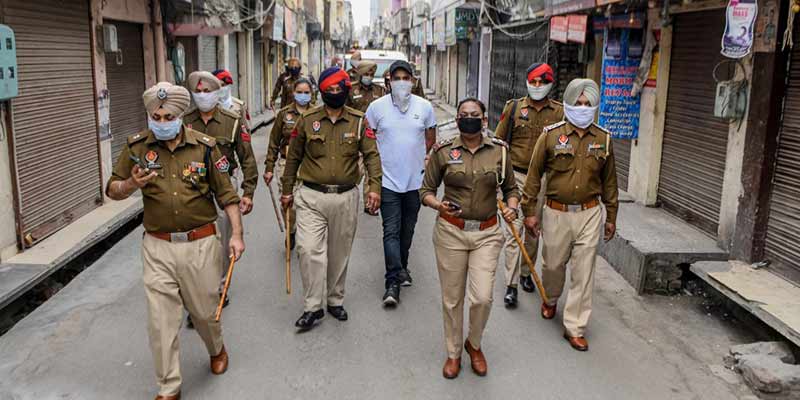- India
- Mar 26
MHA invokes NDM Act for lockdown
The Union home ministry has issued strict guidelines for the enforcement of 21-day complete nationwide lockdown in the wake of COVID-19 pandemic, invoking the National Disaster Management Act, 2005 which may result in imprisonment of up to two years for any violation.
The guidelines listed several services including government and private offices that will be out of bounds during the period, while exempting establishments such as hospitals, ration shops, dairies, banks, insurance offices, print and electronic media.
Delivery of all essential goods including food, pharmaceuticals, medical equipment through e-commerce has also been exempted from the purview of the lockdown, it said.
The guidelines came within minutes of an address to the nation by Prime Minister Narendra Modi on March 24 in which he announced the lockdown and asserted that social distancing is the only way out for the country in its decisive battle against the coronavirus.
The ministry of home affairs issued the exhaustive guidelines invoking Section 51 to 60 of the Disaster Management Act, 2005, and Section 188 of the IPC.
District Magistrates shall deploy Executive Magistrates as incident commander to oversee overall implementation of these measures, the guidelines said.
“In exercise of the powers under the section 6(2)(i) of the Disaster Management Act, 2005, the National Disaster Management Authority has decided to direct ministries/departments of Centre and states and state authorities to take measures for ensuring social distancing so as to prevent the spread of COVID-19 in the country,” the MHA order said.
Disaster management
A disaster refers to a catastrophe, mishap, calamity or grave occurrence from natural or man-made causes, which is beyond the coping capacity of the affected community.
Disaster management involves a continuous and integrated process of planning, organising, coordinating and implementing measures which are necessary or expedient for:
*Prevention of danger or threat of any disaster.
*Mitigation or reduction of risk of any disaster or its severity or
consequences.
*Capacity building including research and knowledge management.
*Preparedness to deal with any disaster.
*Prompt response to any threatening disaster situation or disaster.
*Assessing the severity or magnitude of effects of any disaster.
*Evacuation, rescue and relief.
*Rehabilitation and reconstruction.
Genesis of NDMA
The government of India recognising the importance of disaster management as a national priority, had set up a High Powered Committee (HPC) in August 1999 and a National Committee on Disaster Management in 2001 after the Gujarat Earthquake to make recommendations on the preparation of disaster management plans and to suggest effective mitigation mechanisms.
However, after the Indian Ocean tsunami of 2004, the government took a defining step in the legislative history of the country, through an Act of Parliament, by creating the National Disaster Management Authority (NDMA) to spearhead and implement a holistic and integrated approach to disaster management in India.
NDMA was constituted on May 30, 2005 by an executive order of the government. Subsequently, the Disaster Management Act, 2005 was enacted on 23 December, 2005. NDMA was notified on September 27, 2006 under the provisions of the Disaster Management Act, 2005.
The Prime Minister is the chairperson of the NDMA.
Disaster Management Act
The Disaster Management Act, 2005 (DM Act 2005) lays down institutional and coordination mechanism for effective disaster management at the national, state, district and local levels.
As mandated by this Act, the government of India created a multi-tiered institutional system consisting of the NDMA headed by the PM, the State Disaster Management Authorities (SDMAs) headed by the respective chief ministers and the District Disaster Management Authorities (DDMAs) headed by the district collectors and co-chaired by chairpersons of the local bodies.
These bodies have been set up to facilitate a paradigm shift from the hitherto relief-centric approach to a more proactive, holistic and integrated approach of strengthening disaster preparedness, mitigation, and emergency response.
Functions of NDMA
NDMA has the responsibility for laying down policies, plans and guidelines for disaster management (and coordinating their enforcement and implementation for ensuring timely and effective response to disasters).
It will approve the disaster management plans of the central ministries/departments.
It will take such other measures as it may consider necessary, for the prevention of disasters, or mitigation, or preparedness and capacity building, for dealing with a threatening disaster situation or disaster.
Central ministries/ departments and state governments will extend necessary cooperation and assistance to NDMA for carrying out its mandate.
It will oversee the provision and application of funds for mitigation and preparedness measures.
NDMA has the power to authorise the departments or authorities concerned, to make emergency procurement of provisions or materials for rescue and relief in a threatening disaster situation or disaster.
What is Section 188 of IPC?
Section 188 deals with disobedience to order duly promulgated by a public servant.
It states that, “Whoever, knowing that, by an order promulgated by a public servant lawfully empowered to promulgate such order, he is directed to abstain from a certain act, or to take certain order with certain property in his possession or under his management, disobeys such direction, shall, if such disobedience causes or tends to cause obstruction, annoyance or injury, or risk of obstruction, annoyance or injury, to any person lawfully employed, be punished with simple imprisonment for a term which may extend to one month or with fine which may extend to two hundred rupees, or with both; and if such disobedience causes or trends to cause danger to human life, health or safety, or causes or tends to cause a riot or affray, shall be punished with imprisonment of either description for a term which may extend to six months, or with fine which may extend to one thousand rupees, or with both.”
Manorama Yearbook app is now available on Google Play Store and iOS App Store

